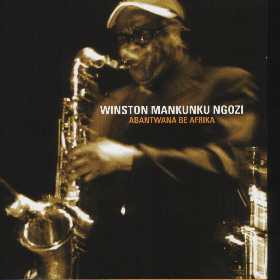Winston
Monwabisi Mankunku Ngozi Ngozi
|
|
Winston
Monwabisi Mankunku Ngozi was born in Retreat, Cape Town in 1943.
His musicality emerged early on and was carefully nurtured by his
mother, Gertrude. Having experimented with piano and trumpet he took up
saxophone in his mid teens.
Along
with one in three South Africans the Ngozi family was uprooted from
their home and relocated to Gugulethu under the notorious Group Areas
Act in the early '60's. By this time however Winston was already gigging
extensively and his early influences in Cape Town included Midge Pike,
Parks Joya, Cups and Saucers and Merton Barrow. But John Coltrane was
perhaps Winston's greatest source of inspiration and his respect and
admiration for ‘Trane’ has endured right through Mankunku's career
to the present day.
South
Africa’s Jazz was profoundly affected by Apartheid and as the regime
tightened its hold during the 60’s many fine musicians and singers
left including for example Miriam Makeba, Hugh Masekela,
Dudu Pukwana, Johnny Gertze, Bheki
Mseleku, Johnny Dyani, Russell Herman and many others. Musicians
at home were discouraged and even prevented from playing together "
across the colour line " and in ‘64 Mankunku did a concert at the
Green Point Art Centre under the pseudonym Winston Mann and behind a
curtain to avoid possible repercussions! In
1968 he recorded the famous Yakhal’Nkomo album together with Early
Mabuza, Agrippa Magwaza and Lionel Pillay. Although he received the
Castle Lager "Jazz Musician of the Year" in the same year, and
despite the fact that the album sold well [and still is -it has been
re-released at least 3 times] Winston received barely any financial
reward. Despite this Mankunku remained in South Africa and by now
cynical of the racist - ridden SA Music Industry simply took the music
to the people live. Over
the years Mankunku has played with most of SA's top musicians. To
mention just a few: Barney Rachabane', Chris McGregor, Victor Ntoni,
Sammy Hartman, Chris Schilder, Monty Weber, Dollar Brand, Pat Matshikiza,
Sandile Shanga, Darius Brubeck, Roger Khosa, The Soul Jazzmen. He has
also performed with many international musicians, including: Chick
Corea, Jack Van Poll, Dave Young, Joe Henderson, Mike Rossi, Toots
Thielemans and Manu Dibango. Having
been introduced in ‘76 by the late Johnny Gertze, Winston worked
extensively with pianist\composer Mike Perry in the early 80’s and
this led to the recording of the acclaimed album Jika in ‘87 as well
as the formation of Winston and Mike's own label Nkomo Records.
Jika's wide scope and excellent individual performances ensured
its success both at home and abroad.
It also contained a strong protest message in songs like
Wajikeleza and Asiyapo.
Although the general tone of the album is sweet and melodic, to
quote a review: Like chilli sauce on an ice cube, Jika was recorded in
London as well as Cape Town. Mankunku’s
international status grew in the following years. He toured Germany and
the UK with Mike Perry in 1989. He toured Sweden and Norway in 1993. In
1996 he toured Belgium twice with pianist Jack Van Poll. This tour
included a memorable set with Toots Thielemans who came on for two songs
and ended up playing all night. After
a gap of nearly ten years Winston and Mike teamed up again and released
Dudula in 1996. It was recorded in Cape Town. It ranges from the
effervescent optimism of Masihambe, which eases one in with a laid back
invitation, to the impatient jive of Khawuleza (Hurry Up!). Dudula by
Mankunku and Perry is a journey in a sense, with obvious reference to
this in the song titles: Masihambe (Lets Go), Dudula (Forward) and
Khawuleza (Hurry Up). And yet the music takes the listener on it's own
journey. It is a positive album, reflecting the social optimism felt in
the mid to late 90's in South Africa.
As a whole it is a laid back album, cool music from a hot climate.
And yet all the songs exist on very different Levels. Masihambe has an
anthem like quality to it, saying ‘Let's go' to all the listeners
collectively. It contrasts with the more intimate tracks: Dudula and
Shirley, which engage the listener on a personal level, speaking to them
on a one to one level. Amanzi Obomi has an essential quality to it
accentuated by Errol Dyers guitar. This is followed by Khawuleza, which
evokes a dusty, bustling sticky village street and is the most energetic
track on the album. The whole is completed by Green and Gold, a more
serious piece, leaving the listener with the understanding of what still
has to be achieved in order for it to work out for the best.
Nkomo
Records released Molo Africa
in 1998, with distribution in areas other than Cape Town being put in
the capable hands of Sheer Sound. The first tracks were laid down in
November 1997. The album features the hit song “ A Song for Bra Des
Tutu”, and features a total of 7 all new tracks with guest artists
Feya Faku, Tete Mbambisa, Errol Dyers, Basil Moses, Lionel Beukes and
Vusi Khumalo, amongst others. Molo Africa won Winston a South African
Music Award at the 1999 5th Annual FNB SAMA ceremony held at
Sun City, in the category “Best Traditional Jazz”. “Molo
Africa” has been re-released by Sheer Sound in 2002 Winston
Mankunku’s latest album ‘Abantwana be Afrika” was recorded in
Johannesburg 2003. Featured artists include:
Andile Yenana (piano), who also co-produced this album, Herbie
Tsoaeli (bass), Prince Lengoasa (Trumpet / Flugelhorn) and Lulu Gontsana
(Drums). For
more information contact Sheer Sound: Tel:
+27 11 444 1818, Fax: +27 11 444 2275, Email: info@sheer.co.za
|
